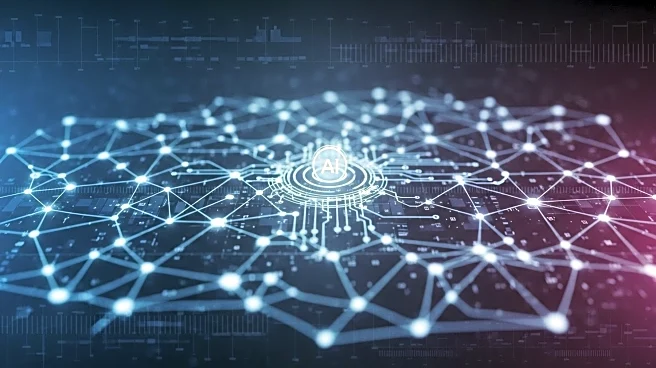What is the story about?
What's Happening?
Telecom Secretary Neeraj Mittal announced that Artificial Intelligence (AI) will play a crucial role in making telecom networks self-healing and improving customer service as the industry transitions from 5G to 6G. Speaking at the India Mobile Congress 2025, Mittal emphasized the government's efforts to keep pace with technological advancements. The collaboration with the International Telecommunication Union (ITU) aims to harmonize AI and telecommunications developments. Mittal highlighted the shift from generative AI to agentic AI, which will replace various functions within the network, enhancing customer service. Industry players anticipate 6G trials to begin in 2028, with commercial deployment following later.
Why It's Important?
The integration of AI into telecom networks is set to revolutionize the industry by enhancing network intelligence and customer service. This development is significant for U.S. stakeholders, as it could influence global telecom standards and practices. The potential for AI to improve network reliability and customer experience presents opportunities for telecom companies to innovate and expand services. However, Mittal also warned of the risks associated with AI, such as deepfakes and financial fraud, highlighting the need for vigilance. The U.S. telecom industry may need to address similar challenges as AI becomes more prevalent.
What's Next?
The next steps involve preparing for 6G trials expected to start in 2028, with commercial deployment anticipated thereafter. Stakeholders, including telecom companies and regulatory bodies, will likely focus on developing AI-driven solutions to enhance network capabilities and customer service. The U.S. may observe these developments closely, considering potential collaborations or adaptations of similar technologies. Additionally, ongoing vigilance against AI-related risks will be crucial, prompting discussions on regulatory measures and security protocols.
Beyond the Headlines
The ethical implications of AI in telecom networks are profound, as the technology could reshape privacy standards and data security. The U.S. may need to consider the balance between innovation and regulation to protect consumer interests. Long-term shifts in telecom infrastructure and service delivery models could emerge, influencing global competitiveness and technological leadership. The focus on AI for good, as emphasized by Mittal, aligns with broader international efforts to ensure responsible AI deployment.















